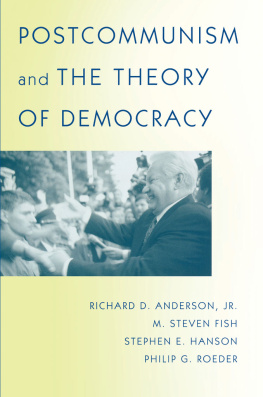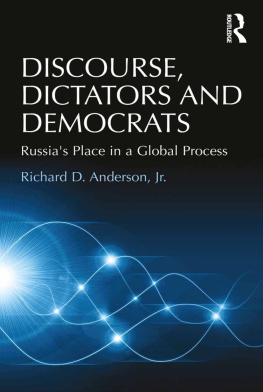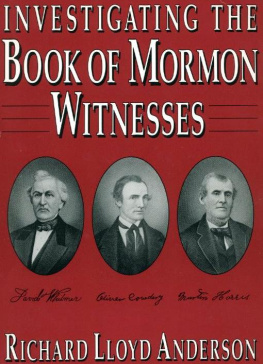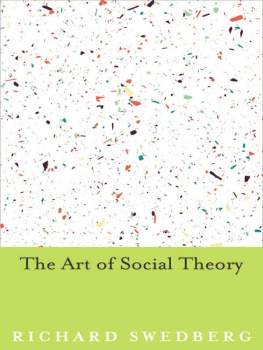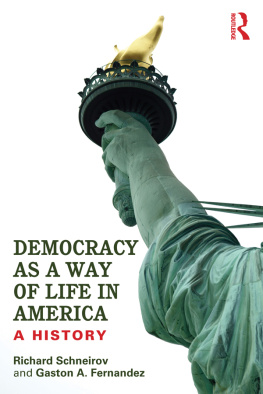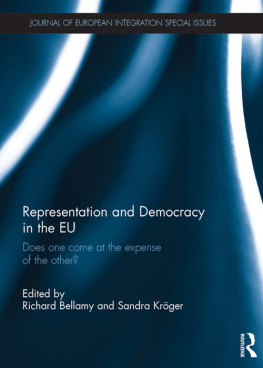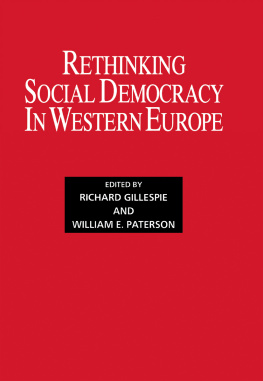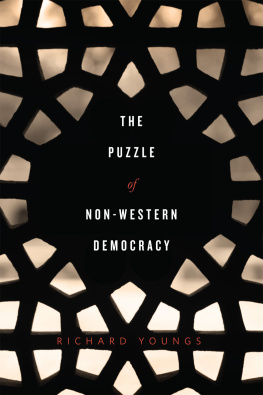POSTCOMMUNISM AND
THE THEORY OF DEMOCRACY
POSTCOMMUNISM AND
THE THEORY OF DEMOCRACY
Richard D. Anderson, Jr.
M. Steven Fish
Stephen E. Hanson
Philip G. Roeder
WITH AN INTRODUCTION BY
George W. Breslauer
PRINCETON UNIVERSITY PRESS
PRINCETON AND OXFORD
COPYRIGHT 2001 BY PRINCETON UNIVERSITY PRESS
PUBLISHED BY PRINCETON UNIVERSITY PRESS, 41 WILLIAM STREET,
PRINCETON, NEW JERSEY 08540
IN THE UNITED KINGDOM: PRINCETON UNIVERSITY PRESS,
3 MARKET PLACE, WOODSTOCK, OXFORDSHIRE 0X20 1SY
ALL RIGHTS RESERVED
LIBRARY OF CONGRESS CATALOGING-IN-PUBLICATION DATA
POSTCOMMUNISM AND THE THEORY OF DEMOCRACY /
RICHARD D. ANDERSON, JR.... [et al.];
WITH AN INTRODUCTION BY GEORGE W. BRESLAUER.
P. CM.
INCLUDES BIBLIOGRAPHICAL REFERENCES AND INDEX.
ISBN 0-691-08916-7 (ALK. PAPER)ISBN 0-691-08917-5
1. FORMER SOVIET REPUBLICSPOLITICS AND GOVERNMENT. 2. DEMOCRATIZATION-FORMER SOVIET REPUBLICS. 3. POST-COMMUNISMFORMER SOVIET REPUBLICS.
4. EUROPE, EASTERNPOLITICS AND GOVERNMENT1989-
5. DEMOCRATIZATIONEUROPE, EASTERN. 6. POST-COMMUNISM
EUROPE, EASTERN. I. ANDERSON, RICHARD (RICHARD DAVIS), 1950-
JN6531 .P67 2001
320.947dc21 20010322107
WWW.PUP.PRINCETON.EDU
eISBN: 978-0-691-23094-8
R0
CONTRIBUTORS
Richard D. Anderson, Jr., is Associate Professor of Political Science at the University of California, Los Angeles, where he is also active in Communication Studies. He is the author of Public Politics in an Authoritarian State (Cornell University Press 1993). His research interests concern the new field of political linguistics.
George W. Breslauer is Chancellors Professor of Political Science and Dean of Social Sciences at the University of California, Berkeley. He is the author or editor of eleven books, including Khrushchev and Brezhnev As Leaders: Building Authority in Soviet Politics (Allen and Unwin, 1982), Russia in the New Century (coedited with Victoria Bonnell, Westview 2000), and the forthcoming Gorbachev and Yeltsin As Leaders. He is also editor of the journal Post-Soviet Affairs.
M. Steven Fish is Associate Professor of Political Science at the University of California, Berkeley. He is the author of Democracy from Scratch: Opposition and Regime in the New Russian Revolution (Princeton University Press 1995).
Stephen E. Hanson is Associate Professor of Political Science at the University of Washington and Director of the Russian, East European, and Central Asian Studies Program of the Jackson School of International Studies. He is the author of Time and Revolution: Marxism and the Design of Soviet Institutions (University of North Carolina Press, 1997) and coeditor (with Willfried Spohn) of Can Europe Work?: Germany and the Reconstruction of Postcommunist Societies (University of Washington Press 1995).
Philip G. Roeder is Associate Professor of Political Science at the University of California, San Diego. He is the author of Red Sunset: The Failure of Soviet Politics (Princeton University Press 1993) and articles that have appeared in the American Political Science Review, International Studies Quarterly, World Politics, and other professional journals.
LIST OF TABLES AND FIGURES
ACKNOWLEDGMENTS
T HE AUTHORS are deeply grateful to the following friends and colleagues who provided advice, assistance in our research, and valuable comments on earlier drafts of one or more of the chapters: Vladislav Andriushenko, Kathleen Bawn, Victoria Bonnell, Valerie Bunce, Valery Chervyakov, Barbara Ann Chotiner, Al Cuzan, Keith Darden, Shanto Iyengar, Margarita Kitaigorodskaia, Jeffrey Kopstein, Natasha Laufer, Lena Morozova, Matthew Murphy, Pavel Parshin, Tatiana Rebetskaia, Sharon Werning Riviera, Richard Rose, Nina Rozanova, Anatolii Shaikevich, Sidney Tarrow, Edward Walker and members of the Program on New Approaches to Russian Security. We did not always have the wisdom to incorporate all of the many incisive suggestions we received, but we did accommodate many of them, and our book is better as a result. The shortcomings that remain, of course, are wholly our own responsibility. The authors also thank the following agencies that provided funding to us individually or as a group: Harvard Universitys Minda de Gunzburg Center for European Studies, the National Council for Central and East European Research, the UCLA Center for European and Russian Studies, the UCLA Academic Senate, the UCLA International Studies and Overseas Programs, and the University of Californias Institute on Global Conflict and Cooperation.
POSTCOMMUNISM AND
THE THEORY OF DEMOCRACY
ONE
INTRODUCTION
George W. Breslauer
W HAT IS a democracy? How does it come into being? What variants of democracy exist in the contemporary world? How do those variants operate? How well do they govern? And what are their developmental trajectories? This cluster of questions about democracy has been perhaps the central concern of American political science throughout the disciplines history. There was a time, not too many years ago, when students of the Soviet Union and Eastern Europe did not have to address these questions. Their scholarship was focused on nondemocracies, whether they were called authoritarian or totalitarian dictatorships. These were democracies only by self-definition or by a definition that removed political freedom and electoral accountability from the meaning of the term.
All this has changed since the collapse of communism. The successor states of the Soviet Union and the postcommunist states of Eastern Europe have gone their own wayssome toward procedural democracy, some toward new variants of dictatorship, and some in directions that are difficult to define. This has meant that some scholars specializing on this part of the world have suddenly become students of democracy, asking many of the questions that have occupied a great deal of attention among comparativists, Americanists, and political theorists during this century. Do Russia, Ukraine, Georgia, and Romania qualify as democracies? If so, what types of democracy are they? How can we explain their progress toward democracyor their movement away from it? And how likely are they to make further progress in building democracies? The present volume makes an important contribution to these debates. But given the recency of transitions to democracy in many postcommunist states, the contributors to this volume are most concerned with questions of definition (are these really democracies?), origination, and prospects for democratic consolidation, rather than with questions central to studies of the operations and performance of established democracies. The main concern of contributors to this volume is to address the vast literature on successful and unsuccessful transitions to democracy that has become a veritable cottage industry within political science in recent decades.
Students of democracy have always had an urge to understand the processes by which democracies emerge in the first place. For decades, the focus of such research was on the social, cultural, and economic conditions that had made possible the emergence of liberal democracies in Western Europe. These provided templates for the enforced democratization of West Germany, Japan, and Italy under occupation regimes following World War II. Retrospective analyses of the emergence of European fascism in the 1920s and 1930s attempted to fathom the conditions that led to the breakdown of regimes that had already embarked on democratizing projects. Bursts of decolonization from the 1940s to the 1960s, in turn, led to a huge effort by scholars to analyze and propose strategies for economic and political development in the Third World that might create the socioeconomic conditions for the eventual creation of stable democracies. The surprising emergence of apparently stable democracies in parts of southern Europe, Latin America, and East Asia during the 1970s and 1980sthe so-called Third Wave of democratizationfostered a large and growing literature that sought to explain how this came about; or, in the cases of works still in progress, to describe, analyze, and track an ongoing process of liberalization and democratization.

